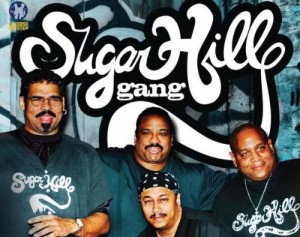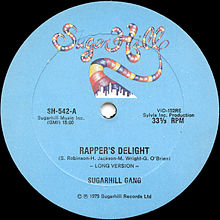At the end of June, 1979, the band Chic released their song “Good Times.” “Good Times” has many of the hallmarks of a 1970s hit with its disco sound and its danceable groove. “Good Times” quickly became a popular song in its own right, but one of its major claims to fame is that it was sampled, meaning its beat was used for another song. Only three months after the public release of “Good Times,” a group known as the Sugarhill Gang released “Rapper’s Delight,” which used the underlying beat from “Good Times.” Even with its sample of “Good Times,” “Rapper’s Delight” is a different type of song. “Raper’s Delight” is not disco like “Good Times;” it is rap. Rap was only just being created in the 1970s, and “Rapper’s Delight” was the harbinger of this new genre. “Rapper’s Delight,” in many of its facets ranging from its lyrics to its musical style to its methods of production and more, had major characteristics that could be considered quite ordinary.
A major aspect of rap in general is its history. Rap began in the South Bronx in New York City as disk jockeys talking, often in rhyme, while introducing upcoming songs and while playing their tunes (Blanchard). The South Bronx in New York in the 1970s was an extremely poor area. This style of music was created by people who held low socioeconomic status and were often African-American. Rap began as a movement of people who were not elite. They were the opposite.
“Rapper’s Delight” was no exception to this rule. The members of the Sugarhill Gang were not from privileged backgrounds. They were lower class artists from the New York area who had not grown up in especially well-to-do households (North Jersey). Englewood, New Jersey, the hometown of the original members, is far from a wealthy area (Factfinder). The artists of the first commercially successful song of what would blossom into a whole genre were not of any special or important social class or group. They were regular people. They were ordinary.

The humble origins of “Rapper’s Delight” did not hinder its importance. The song was hugely influential in starting the whole genre of rap and making rap mainstream (Blanchard). “Rapper’s Delight” was produced by the small label Sugarhill Records, and the following decades saw many more record labels and productions companies sign rap artists. Rap became a major part of American culture after the releases of “Rapper’s Delight” and other songs. What started as poor disk jockeys in the South Bronx met a trio from a town not far away to start a major facet of culture. Before the commercial success of “Rapper’s Delight,” rap and the artists who made it were just regular people.
Enough about the production and background of a song; the most important part is the song itself.
Musically, “Rapper’s Delight” is somewhat simple. The underlying beat is not all that complicated; it is in common time, a generally easy and adaptable time signature to use. It is also somewhat repetitive. In addition to having the song in an easily workable time signature, the writers of “Rapper’s Delight” had a key advantage when writing the music: they did not write the music. Like its inspirations, “Rapper’s Delight” was a song that used a pre existing beat. In the case of “Rapper’s Delight, the beat was a simple baseline with accompanying chords. Disk jockeys by, definition of what they did, used beats and songs they did not write; they played and played with the songs they had on their tables. The beat itself was ordinary to begin with, and artists who were talented or famous for creating popular disco beats never worked even a minute as writers for the Sugarhill Gang. What better way to start a mainstream genre than by ripping a record?
The most influential and defining feature of “Rapper’s Delight” are its lyrics. The way in which these lyrics are presented is simple. The lyrics are mostly presented as rhyming couplets in a simple AABBCC rhyme scheme that continues throughout the song. For example, the first rapper to sing raps, “See I am Wonder Mike and I like to say hello/ To the black, to the white, the red, and the brown the purple and yellow” with the “ow sound at the end of both lines. The song is longer than many at around seven minutes but it is still mostly comprised of a series of rhyming pairs of lines. The way in the which the lyrics are presented is not complicated or hard to understand. It is regular, ordinary.
Not just the way in which the lyrics are presented but the lyrics themselves are simple and commonplace. Early in the “Rapper’s Delight”, the verse “Now what you hear is not a test/ I’m rappin to the beat/ And me, the groove, and my friends/ Are gonna try to move your feet” introduces what the song sets out to do. Rap was a new genre that needed an explanation. The lyrics then discuss topics such as women, “the ladies fight for my delight” and then go to even more average topics. The lyrics “Holiday Inn” are stressed at one point. Saying “Holiday Inn” is one of the song’s largest indications of being average. The song then discusses superheroes with “I said, ‘By the way, baby, what’s your name?/’ Said, ‘I go by name of Lois Lane/ And you could be my boyfriend, you surely can,/ Just let me quit my boyfriend called Superman.’” Toward the end of the song, The Sugarhill Gang inserts a verse about going to a friend’s house where the food is bad. That’s right, the song that brought a new genre into the mainstream mentally brought viewers to a land where “the stinky food’s steamin’, your mind starts to dreamin’/ Of the moment that it’s time to leave/ And then you look at your plate and your chicken’s slowly rottin’/ Into something that looks like cheese.” The lyrics of “Rapper’s Delight” could not signal any more than they already do that this song does not come from a wealthy or especially privileged place. Part of the song comes instead from a place of wanting something good to eat. The topics of this song are all regular conversation. The lyrics of this song comes from a place of being regular, a place of being ordinary.
The general theme here is that “Rapper’s Delight” was born of the ordinary. From its lyrics to its melody to its production “Rapper’s Delight” was made of the regular, ordinary aspects of life. No special or privileged social class started the process of bringing rap music into the mainstream American conscious. This part of American life was not elite or even upper-middle class. It was Englewood, New Jersey and South Bronx, New York coming together to make a song that made a genre that made an industry.
In the late 1950s and early 1960s, the theorist Raymond Williams wrote about what constitutes culture. He argued that the best facets of culture are generally created by people he describes as “ordinary” (Williams). Williams argues that looking for uninfluenced groups in remote regions such as the Appalachian Mountains is not necessary. Instead, culture can be created by people in urban areas so long as they are of the “ordinary” social class as opposed to the educated elite or upper-middle class. Williams published his essays more than a decade before the release of “Rapper’s Delight,” but he was correct in how “Rapper’s Delight” and rap in general would come into being. He knew how new and influential facets of culture would be created. He knew what would form them, what would shape them. A group of ordinary people sampled a song and made it into their own creation. They took something made by people traditionally thought of as professional musicians and created something out of it. A style of music started in a poverty stricken area and became a mainstream national sensation.
“Rapper’s Delight” is ordinary in that playing it on a record or iPod is an ordinary occurrence. This definition of the word ordinary is not the one Williams used. He used the word to mean that the song is musically simple. It is about going to a friend’s house where the food is bad. It is about superhero movies. It is about the concept of rap itself. This song is exactly what Williams meant by “ordinary.”
In being ordinary, “Rapper’s Delight” and its genre is helped springboard became influential to an extent that a song or style created by a class never could. In the decades following the release of “Rapper’s Delight,” rap became a platform for communication about serious societal issues. According to an essay from Stanford University, rap carries the “potential for political advocacy” (Blanchard). “Rapper’s Delight” was able to speak to people about rotting food and Lois Lane. If it can discuss “something that looks like cheese,” rap can present ideas about politics or social change and more, which it did with a high degree of success in later decades.
Culture is ordinary. There is not a special class who are involved in the creation of meanings and values, either in a general sense or in the specific realm of the arts including music. In fact, a great part of the American way of life, and of its arts and learning, is not elite or middle-class. The Sugarhill Gang was in so many ways the definition of ordinary. The music off which they based their songs was ordinary. It was people talking over records; how much more ordinary can there be? No massive studio, no contracts, no child prodigies making songs at the age of four. Rap began as people just talking a little more rhythmically than they usually did. A British Cambridge-educated theorist from the Welsh side of the England-Wales border predicted this creation. A study at a major American university analysed it. Most importantly, the rappers kept rapping and creating the exceptional out of the mundane, or at least some of them did anyway.
